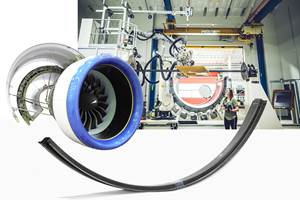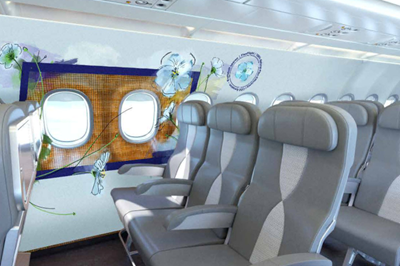Fully recyclable sandwich panel targets aerospace cabin interiors
CAMX 2024: Diab introduces sandwich panels that combine its structural foam core Divinycell F and thermoplastic skins, designed to meet current challenges in sustainability, REACH compliancy and more.
Share
Diab (DeSoto, Texas, U.S. and Laholm Sweden) has developed a new recyclable 100% thermoplastic sandwich panel for aerospace cabin interiors. The thermoplastic sandwich is designed to be a solution to current challenges such as sustainability, REACH compliance and a circular economy.
The solution combines the advantages of Diab’s structural foam core Divinycell F and thermoplastic skins. The materials used have been tested and qualified by aerospace OEMs, and are fully compliant with all industry requirements.
Diab’s sandwich panels for aerospace cabin interiors are made with a custom manufacturing process, including the skins,core bonds and shaping. This can also include decorative skins. Cabin interior panels are produced in a single-step process that yields 30-80% higher mechanical properties and fire resistance behavior than current honeycomb core and phenolic resin solutions, according to the company. The process also decreases weight by up to 10%, reduces production cycle time and reduces production costs by 20%.

Thermoplastic sandwich panels.
Divinycell F is a 100% thermoplastic Divinycell F core material that is already REACH-compliant. It is said to be recyclable and has a zero-waste production process. A sandwich core for commercial aircraft interiors, it is FST-compliant, has low sensitivity to water absorption, optimizes surface finish and reduces labor times. Another focus is its sustainability, which it offers through use of a recycled core.
Diab says it has demonstrated the recyclability of the panel with a process consisting in grinding the panel, then extruding recycled pellets and finally injection molding into 3D parts. Other recycling scenarios are said to be possible.
Related Content
-
Welding is not bonding
Discussion of the issues in our understanding of thermoplastic composite welded structures and certification of the latest materials and welding technologies for future airframes.
-
Plant tour: Joby Aviation, Marina, Calif., U.S.
As the advanced air mobility market begins to take shape, market leader Joby Aviation works to industrialize composites manufacturing for its first-generation, composites-intensive, all-electric air taxi.
-
Plant tour: Airbus, Illescas, Spain
Airbus’ Illescas facility, featuring highly automated composites processes for the A350 lower wing cover and one-piece Section 19 fuselage barrels, works toward production ramp-ups and next-generation aircraft.
Related Content
Welding is not bonding
Discussion of the issues in our understanding of thermoplastic composite welded structures and certification of the latest materials and welding technologies for future airframes.
Read MorePlant tour: Joby Aviation, Marina, Calif., U.S.
As the advanced air mobility market begins to take shape, market leader Joby Aviation works to industrialize composites manufacturing for its first-generation, composites-intensive, all-electric air taxi.
Read MorePlant tour: Airbus, Illescas, Spain
Airbus’ Illescas facility, featuring highly automated composites processes for the A350 lower wing cover and one-piece Section 19 fuselage barrels, works toward production ramp-ups and next-generation aircraft.
Read MoreThe potential for thermoplastic composite nacelles
Collins Aerospace draws on global team, decades of experience to demonstrate large, curved AFP and welded structures for the next generation of aircraft.
Read MoreRead Next
Diab reduces carbon footprint by 46%
Between 2016 and 2021, the sandwich composite solutions company made alterations in material, reduced waste and efficient use of waste, production and energy sources to drive its reduction efforts.
Read MoreLufthansa Technik, Diab develop greener composites for interior cabin components
Aeroflax flax fiber-based prepreg and one-step thermoplastic manufacturing process for 100% recyclable panels production pioneer lighter weight, reduce CO2 emissions.
Read MoreDeveloping bonded composite repair for ships, offshore units
Bureau Veritas and industry partners issue guidelines and pave the way for certification via StrengthBond Offshore project.
Read More












